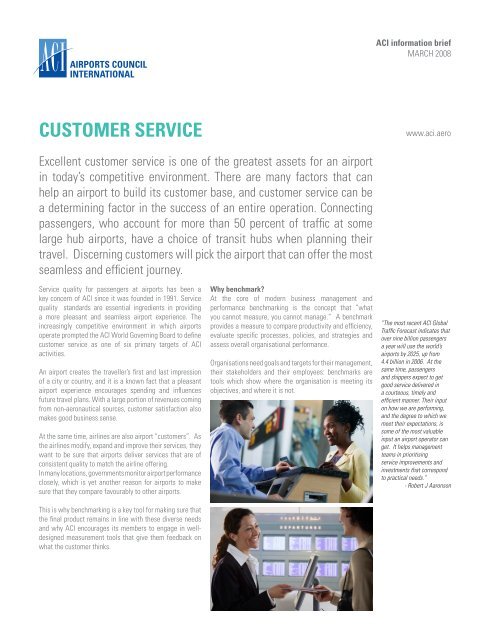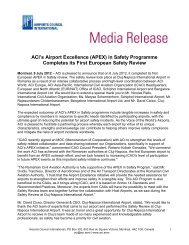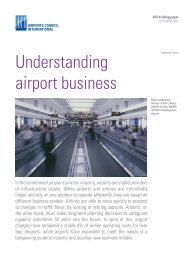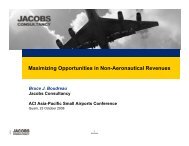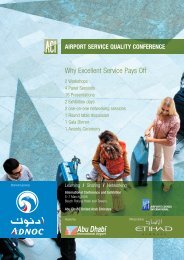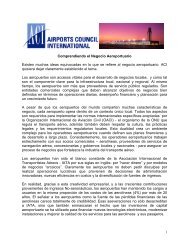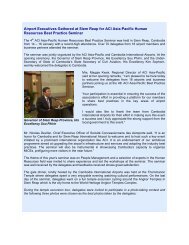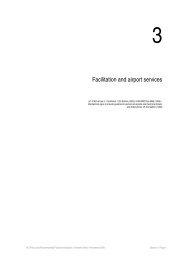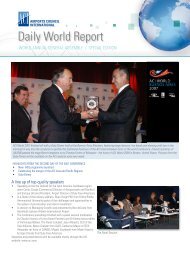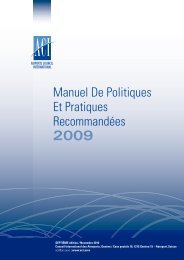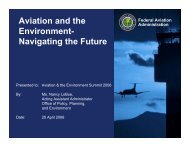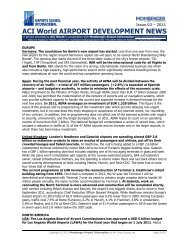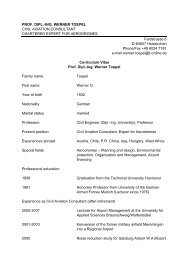CUSTOMER SERVICE - Airports Council International
CUSTOMER SERVICE - Airports Council International
CUSTOMER SERVICE - Airports Council International
You also want an ePaper? Increase the reach of your titles
YUMPU automatically turns print PDFs into web optimized ePapers that Google loves.
ACI information brief<br />
MARCH 2008<br />
<strong>CUSTOMER</strong> <strong>SERVICE</strong><br />
www.aci.aero<br />
Excellent customer service is one of the greatest assets for an airport<br />
in today’s competitive environment. There are many factors that can<br />
help an airport to build its customer base, and customer service can be<br />
a determining factor in the success of an entire operation. Connecting<br />
passengers, who account for more than 50 percent of traffic at some<br />
large hub airports, have a choice of transit hubs when planning their<br />
travel. Discerning customers will pick the airport that can offer the most<br />
seamless and efficient journey.<br />
Service quality for passengers at airports has been a<br />
key concern of ACI since it was founded in 1991. Service<br />
quality standards are essential ingredients in providing<br />
a more pleasant and seamless airport experience. The<br />
increasingly competitive environment in which airports<br />
operate prompted the ACI World Governing Board to define<br />
customer service as one of six primary targets of ACI<br />
activities.<br />
An airport creates the traveller’s first and last impression<br />
of a city or country, and it is a known fact that a pleasant<br />
airport experience encourages spending and influences<br />
future travel plans. With a large portion of revenues coming<br />
from non-aeronautical sources, customer satisfaction also<br />
makes good business sense.<br />
At the same time, airlines are also airport “customers”. As<br />
the airlines modify, expand and improve their services, they<br />
want to be sure that airports deliver services that are of<br />
consistent quality to match the airline offering.<br />
In many locations, governments monitor airport performance<br />
closely, which is yet another reason for airports to make<br />
sure that they compare favourably to other airports.<br />
This is why benchmarking is a key tool for making sure that<br />
the final product remains in line with these diverse needs<br />
and why ACI encourages its members to engage in welldesigned<br />
measurement tools that give them feedback on<br />
what the customer thinks.<br />
Why benchmark?<br />
At the core of modern business management and<br />
performance benchmarking is the concept that “what<br />
you cannot measure, you cannot manage.” A benchmark<br />
provides a measure to compare productivity and efficiency,<br />
evaluate specific processes, policies, and strategies and<br />
assess overall organisational performance.<br />
Organisations need goals and targets for their management,<br />
their stakeholders and their employees: benchmarks are<br />
tools which show where the organisation is meeting its<br />
objectives, and where it is not.<br />
“The most recent ACI Global<br />
Traffic Forecast indicates that<br />
over nine billion passengers<br />
a year will use the world’s<br />
airports by 2025, up from<br />
4.4 billion in 2006. At the<br />
same time, passengers<br />
and shippers expect to get<br />
good service delivered in<br />
a courteous, timely and<br />
efficient manner. Their input<br />
on how we are performing,<br />
and the degree to which we<br />
meet their expectations, is<br />
some of the most valuable<br />
input an airport operator can<br />
get. It helps management<br />
teams in prioritising<br />
service improvements and<br />
investments that correspond<br />
to practical needs.”<br />
- Robert J Aaronson
ACI Airport Service Quality (ASQ) Programme<br />
The ACI ASQ programme consists of three core elements,<br />
each designed to help airports improve and maintain<br />
their customer service quality standards, by reporting on<br />
the experience of passengers, actual service delivery<br />
performance and reviewing the service quality management<br />
system.<br />
1.<br />
2.<br />
3.<br />
ASQ Survey – this surveys passengers on their<br />
perception of an airport’s service quality on a quarterly<br />
basis, benchmarking against the other 100 airports<br />
in the programme. A measurement of passenger<br />
perception.<br />
ASQ Assured – this certification programme<br />
defines best practice service quality management.<br />
It then audits an airport against that benchmark. A<br />
measurement of the management of service quality.<br />
ASQ Performance (from 2008) – this is an analysis<br />
of the actual service delivery performance in key<br />
indicator points, measuring actual data of the length<br />
of queues and the time it take for baggage to be<br />
delivered etc. A measurement of real data.<br />
Together, these three programmes will provide an all-round<br />
assessment of an airport’s customer service and provide<br />
opportunities for improvement.<br />
ASQ Survey<br />
Over 100 airports from all regions worldwide participate<br />
in the ASQ Survey year-round. This consists of a customer<br />
opinion survey carried out at the airport, including both<br />
international and domestic travellers, and aimed at<br />
capturing their immediate impressions of specific service<br />
factors that make up their airport experience, from arrival<br />
to departure at the gate.<br />
The programme provides multi-dimensional benchmarking<br />
of an airport’s service performance with airports of similar<br />
size, in the same region, over time, and on a worldwide<br />
basis. The ASQ assesses and benchmarks 34 service items<br />
of a passengers’ on-the-day airport experience, including:<br />
•<br />
•<br />
•<br />
•<br />
•<br />
Navigation (flight information screens, signposting,<br />
walking distances)<br />
Airport services and facilities (restaurants, shopping<br />
facilities, washrooms)<br />
Security and Immigration (helpfulness of staff, waiting<br />
time at security inspection)<br />
Airport environment (cleanliness, ambience)<br />
Arrivals services (speed of baggage delivery, customs<br />
inspection)<br />
A hassle-free journey is the dream of every traveller. By<br />
better understanding what the passenger perceives to be<br />
negative, airports can set about to rectify the situation to<br />
the best of their ability.<br />
All of the ASQ participants can learn from their peers’<br />
experience, including leading world class airports, and gain<br />
additional benefits that help them to:<br />
1.<br />
2.<br />
3.<br />
4.<br />
5.<br />
Optimise investments efforts<br />
Monitor the performance of suppliers<br />
Share best practice with other airports<br />
Assess the performance of management/ staff<br />
Airport marketing<br />
ASQ Assured<br />
This part of the programme benchmarks<br />
an airport’s passenger service quality<br />
management system and processes<br />
to airport industry best practice. The<br />
ASQ Assured scheme uses a self<br />
assessment approach verified by an<br />
ACI on-site audit. Those airport that<br />
meet best practice in service quality<br />
management and demonstrate a commitment<br />
to continual improvement receive certification.<br />
ASQ Assured is designed to be performance based and<br />
non-prescriptive. It provides a process to drive continual<br />
improvement in service quality and strengthen the customer<br />
focused management culture. It is designed to provide an<br />
industry benchmark against best practice and to identify<br />
opportunities to improve effectiveness and efficiency.<br />
Following certification, an airport sets itself performance<br />
improvement objectives for the next year and at the end<br />
of this period ACI conducts a progress audit. In this way,<br />
airports are able to use the scheme to plan and measure<br />
improvements in service quality, year after year.<br />
ASQ Performance<br />
ASQ Performance is a benchmarking programme which<br />
measures the levels of service delivered by an airport and<br />
puts those measures into context through comparison<br />
with other airports and with passenger satisfaction.<br />
ASQ Performance covers more than 30 key performance<br />
indicators throughout the airport. Examples include<br />
‘waiting time at check-in’ and ‘delivery time of first bag<br />
– last bag’.<br />
ASQ Survey participants (cf. 1 March 2008)<br />
Americas (31): Austin, Atlanta, Bermuda, Calgary,<br />
Cancun, Cleveland, Curacao, Dallas, Denver, Detroit,<br />
Edmonton, Guayaquil, Halifax, Houston HOU, Houston<br />
IAH, Jacksonville, Lima, Mexico City, Minneapolis,<br />
Montreal, Oakland, Ottawa, Port Columbus, Port of<br />
Spain, San Diego, San José SJO, Toronto, Vancouver,<br />
Washington Dulles, Washington DCA, Winnipeg.<br />
Europe (47): Amsterdam, Aberdeen, Athens, Bergen,<br />
Birmingham, Brussels, Budapest, Copenhagen, Dublin,<br />
East Midlands, Edinburgh, Faro, Frankfurt, Funchal,<br />
Geneva, Glasgow, Hamburg, Helsinki, Keflavik, Krakow,<br />
Lisbon, London LGW, London LHR, London STN, Luton,<br />
Lyon, Madrid, Malta, Manchester, Milan Malpensa,<br />
Milan Linate, Moscow DME, Munich, Oslo, Palma,<br />
Paris CDG, Paris ORY, Ponta Delgada, Porto, Rome FCO,<br />
Southampton, Stavanger, Stockholm, Trondheim, Venice,<br />
Vienna, Zurich.<br />
Asia-Pacific (21): Adelaide, Auckland, Bangkok,<br />
Beijing, Cairns, Chennai, Christchurch, Guangzhou,<br />
Hangzhou, Hong Kong, Seoul ICN, Kolkata, Kuala Lumpur,<br />
Melbourne, Mumbai, Nagoya, New Delhi, Singapore,<br />
Shanghai PVG, Sydney, Taipei.<br />
Africa (8): Johannesburg, Cape Town, Durban, Port<br />
Elizabeth, George, East London, Nairobi, Cairo.<br />
Middle East (5): Abu Dhabi, Doha, Dubai, Muscat, Tel<br />
Aviv.<br />
2007 ASQ Survey<br />
award results:<br />
Best airport worldwide<br />
Incheon<br />
Best domestic airport<br />
Halifax<br />
0-5 million passengers<br />
Halifax<br />
5-15 million passengers<br />
Nagoya<br />
15-25 million passengers<br />
Kuala Lumpur<br />
25-40 million passengers<br />
Incheon<br />
40+ million passengers<br />
Hong Kong<br />
www.airportservicequality.aero


